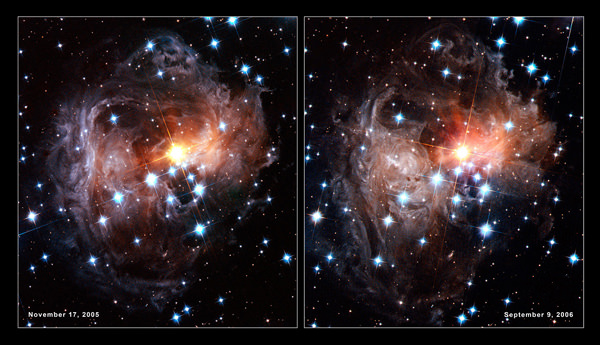[/caption]
Some supermassive black holes are obscured by oddly shaped dust clouds which resemble doughnuts. These clouds have been an unsolved puzzle, but last week a scientist at the University of Leicester proposed a new theory to explain the origins of these clouds, saying that they could be the results of high-speed collisions between planets and asteroids in the central region of galaxies, where the supermassive black holes reside.
While black holes are a death knell for any objects wandering too close, this may mean even planets in a region nearby a black hole are doomed — but not because they would be sucked in. The central regions of galaxies just may be mayhem for planets.
“Too bad for life on these planets, ” said Dr. Sergei Nayakshin, whose paper will be published in the Monthly Notices of the Royal Astronomical Society journal.
In the center of nearly all galaxies are supermassive black holes. Previous studies show that about half of supermassive black holes are obscured by dust clouds.
Nayakshin and his team found inspiration for their new theory from our Solar System, and based their theory on the zodiacal dust which is known to originate from collisions between solid bodies such as asteroids and comets.
The central point of Nayakshin’s theory is that not only are black holes present in the central region of a galaxy, but stars, planets and asteroids as well.
The team’s theory asserts that any collisions between planets and asteroids in the central region of a galaxy would occur at speeds of up to 1000 km/sec. Given the tremendous speeds and energy present in such collisions, eventually rocky objects would be pulverized into microscopic dust grains.
Nayakshin also mentioned that the central region of a galaxy is an extremely harsh environment, given high amounts of deadly radiation and frequent collisions, both of which would make any planets near a supermassive black hole inhospitable well before they were destroyed in any collisions.
While Nayakshin said the frequent collisions would be bad news for any life that may exist on the planets, he added, “On the other hand the dust created in this way blocks much of the harmful radiation from reaching the rest of the host galaxy. This in turn may make it easier for life to prosper elsewhere in the rest of the central region of the galaxy.”
Nayakshin believes that a greater understanding of the origins of the dust near black holes is important to better understand how black holes grow and affect their host galaxy, and concluded with, “We suspect that the supermassive black hole in our own Galaxy, the Milky Way, expelled most of the gas that would otherwise turn into more stars and planets. Understanding the origin of the dust in the inner regions of galaxies would take us one step closer to solving the mystery of the supermassive black holes.”

